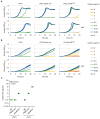The Genetic Background and Culture Medium Only Marginally Affect the In Vitro Evolution of Pseudomonas aeruginosa Toward Colistin Resistance
- PMID: 40558191
- PMCID: PMC12189927
- DOI: 10.3390/antibiotics14060601
The Genetic Background and Culture Medium Only Marginally Affect the In Vitro Evolution of Pseudomonas aeruginosa Toward Colistin Resistance
Abstract
Background/Objectives: Colistin is a last-resort treatment for Pseudomonas aeruginosa multidrug-resistant infections, but resistance to it is emerging. While colistin resistance in P. aeruginosa is typically associated with chromosomal mutations inducing lipopolysaccharide (LPS) aminoarabinosylation, other mutations unrelated to LPS modifications have been proposed to influence the extent of colistin resistance. Here, we examined whether the genetic background and culture conditions affect the evolution of high-level colistin resistance in this bacterium. Methods: We performed in vitro evolution experiments in the presence or absence of increasing colistin concentrations with two phylogenetically distant reference strains in a standard laboratory medium and in two media mimicking P. aeruginosa growth during lung or systemic infections. Resistance-associated mutations were identified by comparative genomics, and the role of selected mutated genes was validated by allele replacement, deletion, or conditional mutagenesis. Results: Most colistin-resistant mutants carried mutations in genes belonging to four functional groups: two-component systems controlling LPS aminoarabinosylation (PmrAB, PhoPQ), LPS biosynthesis, the production of the polyamine norspermidine, and fatty acid metabolism. No mutation was exclusively and invariably associated with a specific strain or medium. We demonstrated that norspermidine is detrimental to the acquisition of colistin resistance upon PmrAB activation and that impaired fatty acid biosynthesis can promote colistin resistance, even if it increases susceptibility to other antibiotics. Conclusions: The evolution of colistin resistance in P. aeruginosa appeared to be only marginally affected by the genetic background and culture conditions. Notably, mutations in fatty acid biosynthetic genes represent a newly identified genetic determinant of P. aeruginosa colistin resistance, warranting further investigation in clinical isolates.
Keywords: PA14; PAO1; artificial sputum medium; colistin; fatty acids; human serum; in vitro evolution; lipid A; norspermidine; polymyxins.
Conflict of interest statement
The authors declare no conflicts of interest.
Figures





References
-
- Narimisa N., Keshtkar A., Dadgar-Zankbar L., Bostanghadiri N., Far Y.R., Shahroodian S., Zahedi Bialvaei A., Razavi S. Prevalence of colistin resistance in clinical isolates of Pseudomonas. aeruginosa: A systematic review and meta-analysis. Front. Microbiol. 2024;15:1477836. doi: 10.3389/fmicb.2024.1477836. - DOI - PMC - PubMed
Grants and funding
LinkOut - more resources
Full Text Sources

